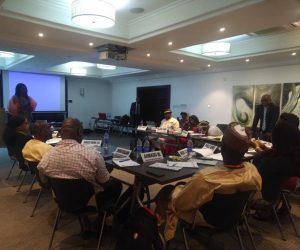SPACES FOR CHANGE facilitated an information-sharing session on the Petroleum Industry Governance Bill (PIGB) for officials of the Department of Petroleum Resources (DPR) at the Public Affairs Management workshop held in Lagos from 16-18 December, 2019. Initiated as a legal framework for undertaking sweeping reforms in Nigeria’s oil and gas industry, the PIGB already passed by the National Assembly, but awaiting presidential assent, proposes major institutional changes to DPR’s regulatory mandate. In particular, it proposes to merge DPR with the Petroleum Inspectorate and the Petroleum Product Pricing Regulatory Agency to create an independent, and more powerful one-stop regulator known as the Nigerian Petroleum Regulatory Commission (“NPRC”), charged with the responsibility to regulate the entire industry, cutting across the downstream, midstream and upstream sectors. Building the capacity of DPR officials to understand the proposed regulatory changes that will come into effect once the President assents to the PIGB is an important first step towards repositioning the institution for a stronger regulatory future.
S4C’s presentation at the workshop chronicled the history of the PIGB, the bill’s passage timelines, and the regulatory changes to anticipate when the bill comes into force. The PIGB is one of the four legislative frameworks split from the parent Petroleum Industry Bill (PIB) to accelerate the passage of the bill. It primarily focuses on the establishment of a legal framework for governance, institutional reorganization and industry regulation. In keeping with this governance-focused approach, the PIGB aims to create efficient and effective governing institutions with clear and separate roles for the petroleum industry, and establish a legal basis for the creation of commercially-oriented and profit-driven petroleum entities that ensure value addition and internationalization of the petroleum industry. The other parts of PIB include: Petroleum Host and Impacted Communities Development Bill (PHCDB), the Petroleum Industry Fiscal Bill 2018 and the Petroleum Industry Administration Bill 2018.
The PIGB’s passage timelines are as follows:
- May 2017: Senate passed the Petroleum Industry Governance Bill (“PIGB”)
- January 2018: House of Representatives passed PIGB on Wed. 17th of January, 2018
- March 2018: Conference Committee on the PIGB harmonise the versions earlier passed by the Senate and House of Representatives.
- August 2018: President withholds assent to the bill
- April 2019: Affected clauses re-drafted and passed by the Senate
- May 2019: Reps pass PIGB — after addressing Buhari’s concerns
- Post-May 2019: Senate harmonises final draft with the House of Representatives after which it was transmitted to the president for assent.
In terms of the regulatory changes to anticipate, the DPR will transmute into the NPRC, which will come about by merging the Petroleum Inspectorate, the current Department of Petroleum Resources and the Petroleum Product Pricing Regulatory Agency (PPPRA). This merger will repeal the Petroleum Products Pricing Regulatory Agency (Establishment) Act, CAP P43, LFN 2004. In the same vein, the Nigerian national oil company, Nigerian National Petroleum Corporation (NNPC) will be split into two limited liability companies, with one holding joint venture assets in the upstream sector and the other holding the production sharing contract assets. This unbundling exercise will repeal the NNPC Act, CAP N123, LFN 2004, and the and NNPC Amendment Act N123.
The new NPRC will be charged with regulating the entire industry, cutting across the downstream, midstream and upstream sectors. The funding of the Commission (NPRC) shall be by appropriation through the National Assembly. One major regulatory shift worthy of note is the transfer of the Minister’s power to grant, amend, renew, extend or revoke any license or lease required for petroleum exploration to the NPRC. This is significant because of the enormous potential it holds to put an end to political interference in industry operations.
Consistent with its expansive regulatory power, the NPRC will conduct open, transparent and competitive bidding for the award of petroleum licenses. However, the President may direct the NPRC to award license to qualified investors outside of the bidding process for strategic and bilateral purposes. Further to this role, it will maintain and make publicly available, a register of licenses, permits, authorizations, awarded, suspended, revoked, surrendered or withdrawn and all modifications. In addition, the body will also have the power to regulate and review prices of petroleum products including gas, and discourage monopoly, or the emergence of a dominant provider. Other roles related to this include market regulation, competition monitoring among industry players.
Very interestingly, the PIGB put an end to the overlapping regulatory functions of the Federal Ministry of Environment (FMOE) and the Nigerian Petroleum Regulatory Commission (NPRC) in matters relating to environmental protection. The regulatory overlap was resolved in favour of the latter with the full responsibility for environmental matters in the petroleum industry is now vested in the NPRC. In fact, the NPRC will ensure compliance with all applicable laws and regulations governing oil and gas operations in the country.
For DPR, creating awareness of the impending policy changes and sensitizing the officials of its Public Affairs Unit about the ensuing institutional adjustments to be made post-PIGB, is a highly effective way of creating a strong corporate governance environment for improving the state of play in the petroleum industry. Not only that, the workshop reflects a deeper institutional readiness to reposition the new NPRC as a proactive and stakeholders-driven regulator. With bated breath, industry watchers look forward to the news of the president’s assent needed to make the PIGB operative.




